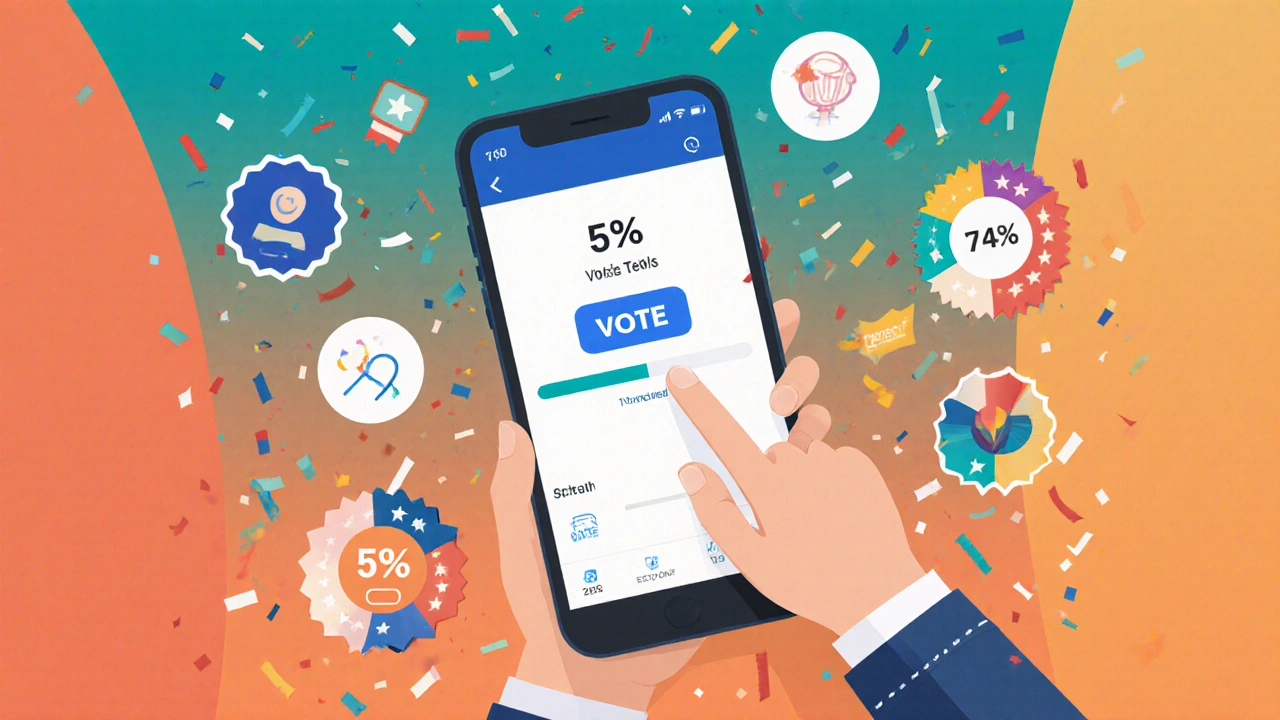Imagine owning a piece of a company, with the power to vote on its next move-whether to spend millions on new features, change its rules, or hire a new team. Now imagine 9 out of 10 people who own that piece never bother to vote. That’s the reality in most DAOs today.
Decentralized Autonomous Organizations (DAOs) were built on the idea of true democracy: one token, one vote. But in practice, fewer than 1 in 5 token holders cast a ballot on most proposals. In 2025, the average voter turnout across DAOs sits at just 17%, with some studies showing participation as low as 6.3%. Meanwhile, over 6.5 million people hold governance tokens, and DAOs collectively manage more than $24 billion in assets. So why does such a small group decide the fate of so much value?
Why People Don’t Vote in DAOs
The problem isn’t that people don’t care. It’s that voting feels pointless, complicated, and unrewarded.
Most DAOs use token-weighted voting. The more tokens you hold, the more power you have. That sounds fair-until you realize that 78% of all governance tokens are held by the top 20% of holders. In some DAOs, fewer than 0.1% of token holders control 90% of the votes. That’s not democracy. It’s plutocracy with blockchain branding.
For small holders, the math doesn’t add up. If you own 0.1% of a DAO’s tokens, your vote has almost no impact. But you still need to spend time reading proposals, understanding technical jargon, paying gas fees, and navigating clunky interfaces. Why bother when you can just wait and benefit from decisions others make? That’s the free-rider problem-and it’s killing participation.
Then there’s voter fatigue. When DAOs send out weekly votes for minor tweaks-changing a fee structure, approving a new meme, adjusting a reward pool-people tune out. Participation drops by 15% every quarter without a clear rhythm or incentive. Smaller proposals often get under 10% turnout. Even big votes, like protocol upgrades, rarely break 25%.
And it’s not just apathy-it’s friction. Snapshot and Tally, the two most popular voting platforms, still require users to connect wallets, understand gas costs, and deal with inconsistent UIs. One developer on GitHub noted that 63% of DAOs need custom code just to set up basic voting. For newcomers, it’s a wall.
What Works: Real Incentives That Move the Needle
Some DAOs have cracked the code. They don’t rely on idealism. They use real incentives.
ArbitrumDAO’s April 2025 vote hit 59.83% on-chain participation-the highest ever recorded. How? They didn’t just ask people to vote. They made it worth their time. They introduced a delegate engagement program, rewarded active voters with extra governance tokens, and simplified the voting interface with mobile-first design. They even sent personalized reminders via Discord and email. The result? First-time on-chain voters didn’t drop-they grew.
Gitcoin’s Quadratic Funding rounds saw 22% higher participation when paired with educational campaigns. They didn’t just explain how to vote-they showed why it mattered. They created themed governance weeks, bundled proposals into digestible themes, and limited voting to specific days each month. That rhythm gave people something to look forward to, not dread.
DAOs that pay delegates for good voting decisions are seeing even stronger results. The ABFER 2025 study found that delegates who made accurate, community-aligned votes earned an average of $2,832 more per year. Their compensation wasn’t fixed-it was tied to participation quality. If a delegate’s voting accuracy fell below 75%, they got nothing. Above that, their pay rose with their impact. That’s not a bribe. That’s accountability.
Mobile-friendly interfaces are another game-changer. Users aged 18-21, who make up just 10% of DAO participants, show 15.3% higher engagement when voting happens through apps instead of desktop wallets. Younger users aren’t lazy-they’re just not going to log into a browser extension to vote on a 10-page proposal.

Nudges That Work Without Paying
You don’t always need cash to get people to act. Sometimes, you just need to make the right choice the easy choice.
One simple nudge: send a notification when a vote is about to close. DAOs that use automated, personalized reminders see 10-15% higher turnout. No extra cost. Just better timing.
Another: show people how their vote compares to others. A dashboard that says, “You’re in the top 12% of voters this month,” triggers social recognition. People care about reputation-even in crypto.
Some DAOs now use “voting streaks.” Vote three times in a row? Unlock a badge. Vote five times in a month? Get early access to a new feature. Gamification doesn’t have to be childish. It just has to be human.
Delegated voting is another quiet win. Instead of asking every holder to vote on every proposal, let them assign their vote to someone they trust-a delegate. Harvard Business School found that delegation boosts governance efficiency by 30-50%. It’s like having a representative in Congress, but you can switch them anytime. DAOs like Aave and MakerDAO use this model successfully. Their voter turnout stays above 22% because the burden isn’t on everyone.

The Future: What DAOs That Survive Will Do Differently
DAOs that keep relying on token-weighted voting alone are headed for collapse. By 2027, analysts predict those without incentives will see participation drop below 10%. The ones that survive? They’ll combine three things: financial rewards, reputation systems, and delegation.
They’ll stop flooding their communities with 10 proposals a week. Instead, they’ll bundle votes into monthly governance cycles-like a quarterly shareholder meeting, but on-chain.
They’ll make voting feel like a contribution, not a chore. That means clear, short summaries. Video explainers. Community debates in Discord. They’ll even let people vote with their time-contributing code, writing docs, or moderating forums-in exchange for voting power.
And they’ll stop pretending everyone needs to vote on everything. Not every holder is a governance expert. That’s fine. Let them delegate. Let them earn reputation. Let them be part of the system without being burdened by it.
The goal isn’t 100% turnout. That’s impossible. The goal is sustainable engagement-where the people who care most, have the most influence. Where small holders feel heard. Where delegates are rewarded for doing the right thing. Where voting isn’t a burden-it’s a privilege.
What You Can Do Today
If you hold DAO tokens, don’t wait for someone else to fix it.
- Start by voting on one proposal this month-even if it’s small.
- Delegate your vote to someone whose decisions you trust.
- Join the DAO’s Discord or Telegram. Ask questions. Push for clearer proposals.
- If you’re a core member: simplify the voting process. Cut the noise. Reward participation.
DAOs won’t become truly decentralized until the people who hold the tokens start acting like they own them. Not because they have to. But because they want to.
Why is voter turnout so low in DAOs?
Voter turnout is low because most DAOs use token-weighted voting, which gives disproportionate power to large holders. Small token holders feel their vote doesn’t matter, and voting requires time, technical knowledge, and gas fees. Without rewards or clear incentives, many choose to free-ride instead of participating.
Do financial incentives really work for DAO voting?
Yes. DAOs that offer rewards-like extra tokens, governance credits, or direct payments to delegates-see participation increase by 10-15% on average. The ABFER 2025 study showed delegates who made accurate votes earned an extra $2,832 annually. Financial incentives don’t corrupt governance-they align it with real participation.
What’s the difference between token-weighted and quadratic voting?
Token-weighted voting gives one vote per token, so big holders dominate. Quadratic voting lets people cast more votes, but each additional vote costs more-so power is spread more evenly. It’s designed to reduce whale influence. Over 100 DAOs, including Gitcoin and Optimism, use it, but it’s still less common than traditional models.
Can delegation solve voter apathy?
Yes. Delegation allows token holders to assign their vote to someone else-like a trusted expert or community leader. DAOs using delegation see 30-50% higher governance efficiency. It reduces the burden on casual holders while keeping decision-making in competent hands. Aave and MakerDAO use delegation successfully.
Why do some DAOs have higher participation than others?
High-participation DAOs like ArbitrumDAO combine multiple strategies: mobile-friendly interfaces, scheduled voting cycles, delegate rewards, educational content, and personalized reminders. They treat governance like a product-designing for usability, not just compliance. Low-participation DAOs treat it like a checkbox: they launch a vote and hope for the best.


Kasey Drymalla
November 26, 2025 AT 07:11Priti Yadav
November 27, 2025 AT 11:51Nathaniel Petrovick
November 27, 2025 AT 18:13Jane San Miguel
November 29, 2025 AT 17:30Dave Sumner Smith
November 30, 2025 AT 12:30Sally McElroy
December 1, 2025 AT 20:56Honey Jonson
December 2, 2025 AT 19:26Jeroen Post
December 3, 2025 AT 11:21Elmer Burgos
December 3, 2025 AT 21:28Sara Escanciano
December 4, 2025 AT 02:06Cait Sporleder
December 5, 2025 AT 08:06Destiny Brumbaugh
December 7, 2025 AT 02:22